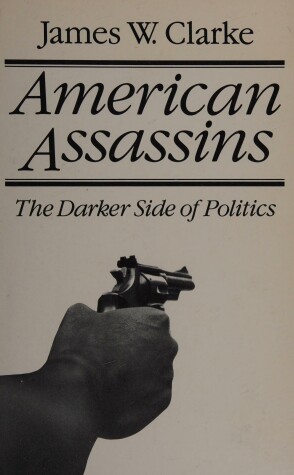From Richard Lawrence, who attempted to shoot President Andrew Jackson in 1835, to the assailants of contemporary American political leaders, this book probes the lives of sixteen individuals who tried to kill or did kill our presidents and other prominent politicians. Lawrence, who misfired two pistols one after the other at a frail and elderly Jackson, thought himself to be King Richard III of England. He was so obviously insane that he was acquitted of his crime, to spend the rest of his life in a mental institution. What of the other assassins? asks James W. Clarke. Was John Wilkes Booth nothing other than a crazy actor, motivated by an insanely jealous desire for fame and recognition? Were the anarchist beliefs of McKinley's assassin, Leon Czolgosz, the delusions of a madman? Can Sirhan Sirhan's Arab nationalism be dismissed as an expression of oedipal conflict? In studies of the sixteen assassins and would-be assassins, Professor Clarke introduces evidence of real differences among men and women who until now have been lumped together under the rubric of what the author calls a pathological theory of assassination.
With assassination attempts increasing dramatically in number, this book clarifies our thinking about an important subject: social commentators--historians, psychiatrists, and journalists--have been mistaken in categorizing all the attackers as delusional, deranged, or schizophrenic. It is comforting to ignore the political experience of the violent people considered in this book and to apply the label of severe mental illness to anyone seeking to harm an important political leader. Professor Clarke deprives us of that comfort by considering the actions of his subjects in their cultural, political, and social contexts and by treating not only their subjective realities but the objective historical circumstances they faced. He draws on a wide range of primary sources to convey a mood in each case that contributes to an understanding of the attacker and the times in which he lived. Emphasizing the differences among his subjects, he classifies them into four basic psychological types that summarize patterns in their behavior and make important distinctions among their emotional and cognitive characteristics.
Professor Clarke ends his book with a series of searching questions about the effects of media coverage of assassination attempts and about our methods of protecting the safety of our political leaders. He concludes that the social costs of domestic surveillance would outweigh its dubious benefits but that confiscation of handguns is imperative to reduce the increasing occurrence of assassinations.
- ISBN10 0691022216
- ISBN13 9780691022215
- Publish Date 19 March 1990 (first published 21 September 1982)
- Publish Status Out of Print
- Out of Print 15 October 1998
- Publish Country US
- Imprint Princeton University Press
- Format Paperback (US Trade)
- Pages 344
- Language English
- URL https://press.princeton.edu/titles/299.html
